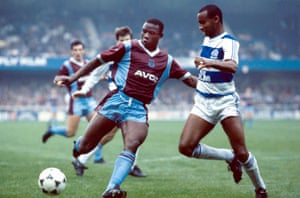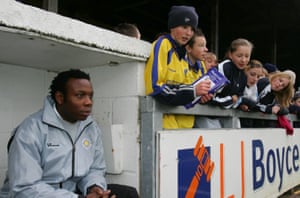[ad_1]
Leroy Rosenior is probably no longer the most recognised member of his family, with his son Liam making his name as a coach alongside Wayne Rooney at Derby and also on the panel to select the Football Association chairman. But after almost four decades in the public eye that took in spells at Fulham, QPR and West Ham in the 1980s, the former striker, who is remembered for having the shortest managerial reign, at Torquay in 2007, is almost ready to pass on the baton to the next generation.
“I’m always proud of Liam but it’s not just about his coaching – he is a good person,” says Rosenior. “He has always wanted to coach and tells the story about staying up and pretending to be asleep while he was listening to me and Paul Mortimer talking all night about football. Liam gets his message across brilliantly and that is the key.”
That trait appears to run in the family. On Wednesday, Show Racism the Red Card celebrates its 25th anniversary after being established when the Newcastle goalkeeper at the time, Shaka Hislop, made a £50 donation to a local anti-racism campaigner Ged Grebby after being racially abused at a petrol station. Rosenior has been giving workshops on behalf of the charity for 16 years and is vice-president and an ambassador.
“I wanted to get involved on the ground, by going into schools, because that is where my passion was,” says Rosenior, who also works as an assistant producer and pundit for Premier League productions. “I seem to have a knack of getting people to listen and then ask questions afterwards. My dad was a great storyteller – he was the best I have ever known – and I work in television as a broadcaster so have all the skills to get a message across to people.”
The experiences of his father, Willie De Graft Rosenior, who arrived in the UK during the 1950s from Sierra Leone, helped shape Rosenior, but one particular moment changed his career path for ever.
“I always tell the story about Justin Fashanu because he was my idol when I was growing up,” he says. “With him it was a double whammy because not only was he black, but he was also gay. He came to West Ham on loan while I was there and I remember one day him getting in the communal bath and two guys got up and walked out. I knew exactly why they had done that.
“Eight or nine years later, when I heard that Justin had killed himself, I thought back to that moment and realised I could have done something if I was educated or had the knowledge to communicate. Maybe if I had I could have said: ‘Sit down, don’t worry he won’t fancy you’ or something and that could have defused the situation, but I didn’t. That was one of the driving forces in me getting involved in diversity and inclusion and trying to pass on a positive message.”

From schools to trade unions and now also as an ambassador for West Ham’s Foundation having previously worked for Kick it Out, Rosenior estimates he has reached thousands of people with his talks. He feels his message is being heard, but episodes such as last Saturday when some Millwall supporters booed players taking a knee shows there is plenty of work to do.
“It frustrates me because we always have these incidents and afterwards everyone just talks about how important education is. But they don’t know how to put that into practice. How does it work? Where do we need to target? For instance, usually the kids get it much better than the adults.”
Rosenior refuses to blame the colour of his skin for a lack of opportunities as a manager and has only fond memories of his two spells at Torquay – even if the second lasted for barely 48 hours rather than the 10 minutes often stated.
“It wasn’t until the Friday, when I was watching Have I Got News For You I was described as having the shortest managerial reign of just 10 minutes, that everyone starting ringing me up to ask if I was all right.
“I was already doing work for the BBC, but that led to me being asked to do the Africa Cup of Nations, which is how I started my new career. So when they say any publicity is good publicity, it definitely worked for me.

“At that point, I made a conscious decision to concentrate on broadcasting and working in anti-racism. When we got promoted with Torquay it was the most incredible achievement, but off the back of that I had one interview for the Brighton job and Mark McGhee got it. I was of the understanding that if I did really well then the opportunities would come. But they didn’t. If there was a young manager who was white and had done what I had done then things might have been different.”
Rosenior, who was held at gunpoint in Mali after being sent off while managing Sierra Leone – “they wouldn’t let me go back to the dressing room” – detailed many of his experiences of racism as a player in his book, It’s only Banter, released in 2017. Since moving into broadcasting, he has also noticed a slow shift in attitudes.
“When I started at the Premier League, the only other black people in the building were the cleaners,” he says. “It is a global brand and there was a moment when they realised that their on-screen presence didn’t represent the people they were reaching. Now I know so many black people who are working here and we have made a lot of progress, although that’s still not the same behind the scenes. I try to drive that as much as I can.”
As for Liam, who is tasked with finding a replacement for Greg Clarke at the FA, Rosenior says: “Hopefully it’s a step in the right direction for Liam to be involved because if you have six white middle-aged men who are choosing the next chairman then you will get a decision based around their experiences. But if you have a more diverse selection of people then you are going to get a much better decision. They have to recognise that it’s good for them and not just tokenism.”
[ad_2]
Source link